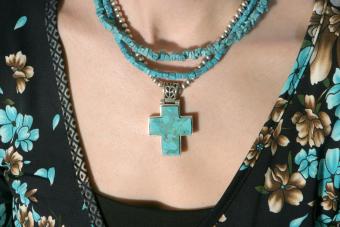
The African fire opal is a unique and stunning stone of bright red, orange, and yellow tones. The stone is coveted by many for its beauty as well as its unique healing properties.
How Fire Opal Is Created
Fire opal forms deep down in volcanoes, where water trickles deep into the cracks and seams of lava. With so much heat and pressure, the lava is able to contain the water droplets, trapping them and forming the bright color characteristic of the stone.
The Famed Fire Effect
What distinguishes fire opals from other opals is the color display. The color of fire opal is consistently bright throughout the stone. It wasn't until the mid-1960s that scientists possessed the right technology to determine what's responsible for the fire in opals. Fire opal colors range from semi-transparent to transparent while revealing tiny spheres of bright yellows, oranges, and reds that seem to float around inside the stone. Researchers discovered that these floating spheres are a silica gel composite and are trapped inside the stones. The floating effect isn't an illusion. The spheres are literally floating between pockets of air and water. The movement of the spheres, combined with the play of light refracting off of the water and air, gives a brilliant display of sparkle that is referred to as fire.
Fire Opal Legend
The Aztecs valued opals and named them the "gem of the bird of paradise." The Aztecs believed that the opal was the byproduct of God's creation of the world, having bubbled out of the ground as a gift from their maker. Other cultures held fascinating lores regarding varying opal stones as well. Ancient Arabs believed that opals fell from the heavens in lightning flashes. The Greeks believed that opals had the ability to give them prophecy and guard them against sickness.
Unique Healing Properties
Many stones are believed to have certain powers. The fire opal has long been thought to help those who possess it in their relationships, health, and careers.
Love and Relationships
Fire Opals foster creativity and passion. Those wearing them or calling upon their powers often believe that it helps connect them to their partner more deeply, fostering love and passion.
Wealth
The fire oral is thought to encourage wealth and luck in the business realm. Just having the stone in your place of business might attract customers or business opportunities. For those unsure of their next career move, the fire opal can motivate them to take risks. The stone encourages innovation and new ideas.
Physical Health
The fire opal is thought to have the power to alleviate kidney and back issues. It is also thought to be of aid regarding nails, teeth, hair, and bone problems. The fire opal has long been believed to assist in combating infections, particularly ulcers, colds, and flu viruses.
Spirituality
Fire opal helps people trust in themselves and fosters independent thinking. They are thought to help some people let go of negative feelings and deep senses of grief.
Mining of Fire Opals
Mineral mining in Ethiopia resumed in 2000 after the Eritrea-Ethiopian War ended. Before that, renowned archeologist Louis S. G. Leaky found the first recorded African opal in 1939 in East Africa. The opal was part of an artifact discovered in a cave in Kenya and was carbon-dated to about 4,000 BC. At the time of this discovery, there were hardly any opal mines operating in Africa. Twenty-one years later, the mining of green opals in Tanzania and subsequently a fire opal vein discovered in Morocco brought Africa into the opal limelight.
North American fire opals are mined mainly in Mexico. Australia, known for its opal mines, also produces fire opals that are highly prized. The fire opals of Africa are mostly found in two countries: Ethiopia and Tanzania. However, some mines in Mali produce a significant amount of fire opals.

Not All Fire Opals Are Equal in Value
As with most gems and stones, value ranges greatly depending on several factors. With the fire opal, visibility, clarity, complexity, and vibrance of color, as well as the color hue itself, all contribute to whether a fire stone will be on the more valuable side. Stones with deep red tones are typically more valuable than those with yellow tints.
Fire Opal Cuts
Not only can a fire opal be cut in the traditional opal cut of cabochon, but it can also be faceted. Stonecutters and jewelers recommend using a fire opal for a jewelry piece that won't receive hard impacts. This means it's best to use this stone for a pair of earrings, brooch, or pendants. Jewelers don't suggest using fire opals in a ring, since it's very easy to hit the stone against a hard surface and chip or crack it.
Caring for Fire Opal
Opals are one of the most delicate stones known to us, and because of this, their care is different from other stones. Opals are soft stones and can be scratched quite easily; thus, it is important to guard them against anything that might blemish their brilliant surface. They are also made of up a high water content. When kept in places with low humidity, the stone can become to dry and crack.
When caring for jewelry made of opal, only use dish detergent and warm water. Never use harsh chemicals or bleach on your opal jewelry or ultrasonic cleaners, as their intense vibrations can create cracks in the stone. Since opals tend to be fragile, they are sometimes treated with mineral oil or wax, similar to emeralds and other soft gems. In light-colored opals, this type of treatment carries the risk of yellowing the stone.
When storing opal, considering placing your stone in a sealed bag with a damp piece of cotton. This will aid in preventing dehydration of the fire opal.
Stunning Stone Full of Uniqueness
The opal stones are some of the most unique and intriguing of all the stones. Their appearance and boundless healing properties put the fire opal in a category all its own. For those looking to wear gems that stand-alone, and march to the beat of their own glittery drum, the fire opal is a perfect choice.







